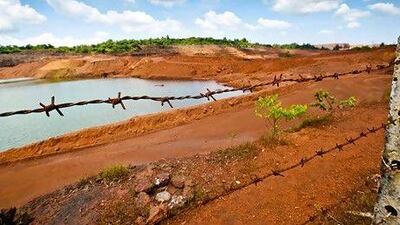Troubles in India's mining sector are deepening.
The eastern state of Orissa, India's biggest producer of iron ore, has slapped fines on several companies for alleged irregularities and excess production. Among these, the state government has issued a US$1 billion (Dh3.67bn) penalty to Tata Steel, one of India's largest steelmakers, which is challenging the fine.
"We reiterate our contention that we have always undertaken mining in Orissa and also in other states where we operate in strict conformity with the existing laws," said Tata.
The latest issue in the sector follows a complete ban on mining in Goa in September because of alleged illegal mining and concerns about the impact of the industry on the environment.
A ban on iron ore operations in the state of Karnataka has only recently started to be eased.
The majority of India's iron ore exports go to China. India produced about 160 million tonnes of iron ore in the last financial year, a figure that is expected to fall sharply this year.
RK Sharma, the secretary general of the Federation of Indian Mineral Industries, said Orissa's action against the companies was questionable.
"Whatever the Orissa government has done is illegal," he said. "It won't stand up in court, so the federal government is advising the Orissa government that whatever fines they are imposing is not legal."
As such, Mr Sharma says he remains confident that production will not be affected.
Tata Steel is also hopeful that the issue will be resolved.
"The government of India has recently brought out a notification defining irregularity in mining operations and illegal mining.
"This distinction is an important aspect of the whole issue of the demand put forth by the state government. We are confident of resolving the issue with the government amicably."
In Goa, meanwhile, mining is at a complete standstill because of the ban. Authorities and mining companies had hoped that the issues would be resolved by now, but there is little clarity on the fate of the sector.
The suspension of mining followed an inquiry, which stated that operators going beyond their boundaries and "unregulated" and "unrestricted" illegal mining had resulted in 350bn rupees (Dh23.73bn) of losses to the state, as well as environmental destruction. Iron ore mining is the second-largest contributor to Goa's economy after tourism, with the state being India's second-biggest producer and the country's largest exporter of the material.
Haresh Melwani, the chief executive of HL Nathurmal, a mining company in Goa, had expected his mine to be up and running again by now.
"Everything continues to be suspended," he said. "The matter is now in the hands of the Supreme Court, which has been conducting an investigation of mines in Goa to compile its own report. Now everything really hinges on what emerges from the report."
The ban was jeopardising the livelihood of the many Goans it employs, while many stakeholders in the industry, including barge owners and truck owners, are struggling with their loan repayments on their equipment and vehicles because of the ban, he explained.
"I'm worried," said Mr Melwani. "There's too much postponement."

